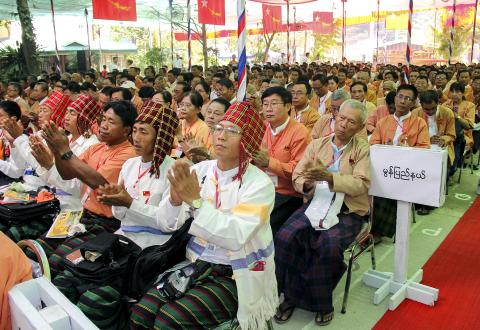Aung San Suu Kyi’s opposition party opened a historic conference yesterday seen as a key chance to revitalize the popular but inexperienced party, which faces major challenges ahead of elections in 2015.
The Nobel Peace Prize laureate’s National League for Democracy (NLD), for years banned by a junta that lived in fear of its huge public support, has been urged to enlist the help of outside experts and inject new blood into its elderly top ranks.
Propelled by Aung San Suu Kyi’s huge popularity, the NLD is widely expected to take power in the country also known as Burma if the next election is free and fair, capping a remarkable transition from military rule to democracy.

Photo: EPA
However, some experts question whether the opposition is ready for the myriad challenges of running the impoverished nation, which include building basic infrastructure, kick-starting the economy, redrawing the legal system and reviving poorly funded health and education sectors.
“It will be a litmus test for them, whether they are a party coming out of the darkness and proving they are worthy of leading this country,” said one Burmese political analyst who asked to remain anonymous.
“The NLD will need to build capacity within the organization if they become the next government. I don’t think they have anyone capable of running this show,” he added.
The NLD faces the financial and political might of Burmese President Thein Sein’s Union Solidarity and Development Party (USDP), created by former generals who shed their uniforms to run for office in controversial elections held in 2010.
The USDP, which suffered a major drubbing at the hands of the NLD in by-elections held in April last year that saw Aung San Suu Kyi elected to parliament, is also searching for a new strategy to avert a major defeat.
An estimated 850 representatives from all corners of the country are to attend the three days of talks that aim to redefine the NLD leadership — an event hailed by the party as unprecedented in the country’s troubled history.

SECURITY: As China is ‘reshaping’ Hong Kong’s population, Taiwan must raise the eligibility threshold for applications from Hong Kongers, Chiu Chui-cheng said When Hong Kong and Macau citizens apply for residency in Taiwan, it would be under a new category that includes a “national security observation period,” Mainland Affairs Council (MAC) Minister Chiu Chui-cheng (邱垂正) said yesterday. President William Lai (賴清德) on March 13 announced 17 strategies to counter China’s aggression toward Taiwan, including incorporating national security considerations into the review process for residency applications from Hong Kong and Macau citizens. The situation in Hong Kong is constantly changing, Chiu said to media yesterday on the sidelines of the Taipei Technology Run hosted by the Taipei Neihu Technology Park Development Association. With

‘FORM OF PROTEST’: The German Institute Taipei said it was ‘shocked’ to see Nazi symbolism used in connection with political aims as it condemned the incident Sung Chien-liang (宋建樑), who led efforts to recall Democratic Progressive Party (DPP) Legislator Lee Kun-cheng (李坤城), was released on bail of NT$80,000 yesterday amid an outcry over a Nazi armband he wore to questioning the night before. Sung arrived at the New Taipei City District Prosecutors’ Office for questioning in a recall petition forgery case on Tuesday night wearing a red armband bearing a swastika, carrying a copy of Adolf Hitler’s Mein Kampf and giving a Nazi salute. Sung left the building at 1:15am without the armband and apparently covering the book with a coat. This is a serious international scandal and Chinese

A US Marine Corps regiment equipped with Naval Strike Missiles (NSM) is set to participate in the upcoming Balikatan 25 exercise in the Luzon Strait, marking the system’s first-ever deployment in the Philippines. US and Philippine officials have separately confirmed that the Navy Marine Expeditionary Ship Interdiction System (NMESIS) — the mobile launch platform for the Naval Strike Missile — would take part in the joint exercise. The missiles are being deployed to “a strategic first island chain chokepoint” in the waters between Taiwan proper and the Philippines, US-based Naval News reported. “The Luzon Strait and Bashi Channel represent a critical access

COUNTERINTELLIGENCE TRAINING: The ministry said 87.5 percent of the apprehended Chinese agents were reported by service members they tried to lure into becoming spies Taiwanese organized crime, illegal money lenders, temples and civic groups are complicit in Beijing’s infiltration of the armed forces, the Ministry of National Defense (MND) said in a report yesterday. Retired service members who had been turned to Beijing’s cause mainly relied on those channels to infiltrate the Taiwanese military, according to the report to be submitted to lawmakers ahead of tomorrow’s hearing on Chinese espionage in the military. Chinese intelligence typically used blackmail, Internet-based communications, bribery or debts to loan sharks to leverage active service personnel to do its bidding, it said. China’s main goals are to collect intelligence, and develop a